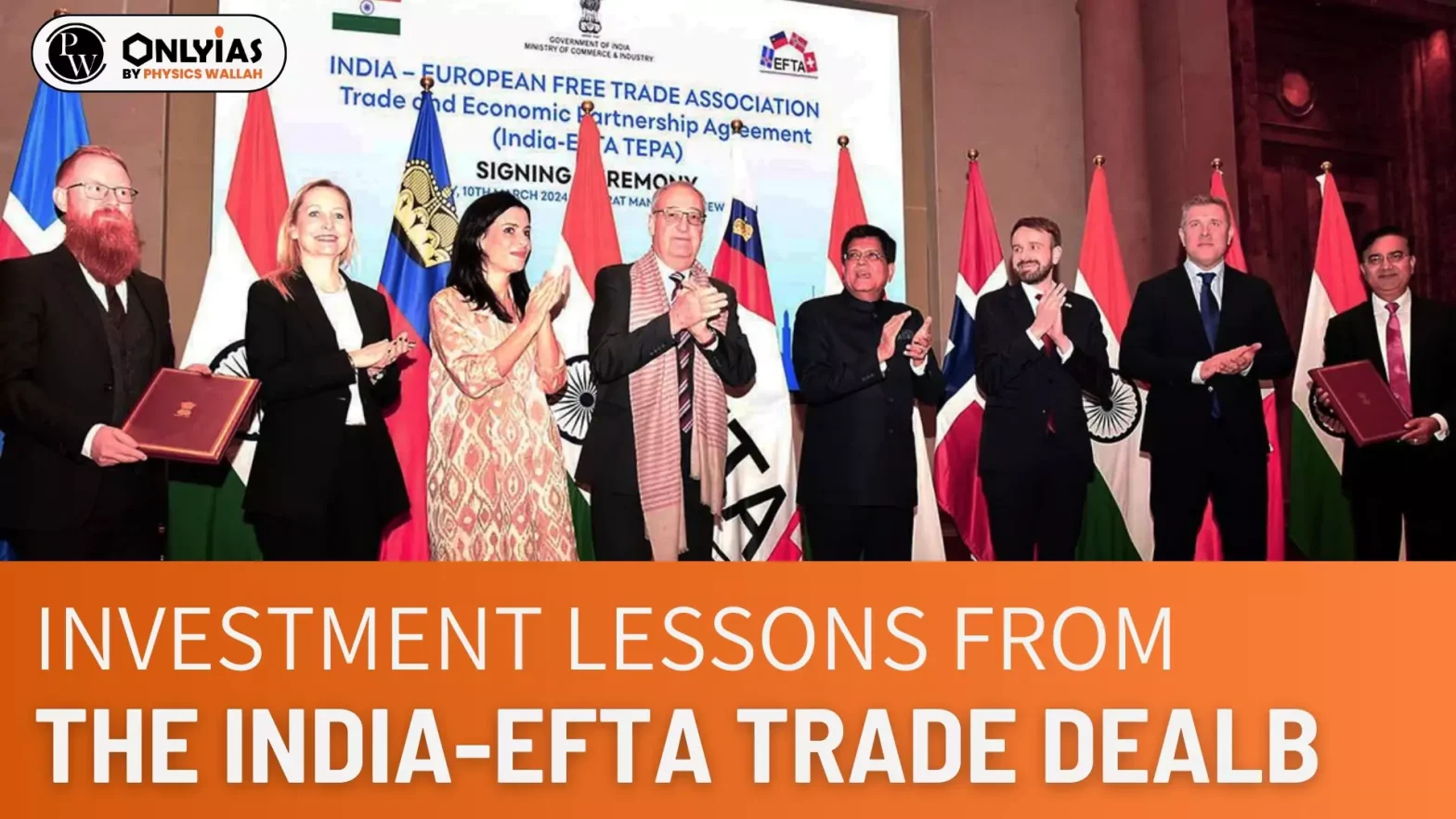Context
Recently, India made a historic trade deal with the European Free Trade Association (EFTA), comprising Iceland, Liechtenstein, Norway and Switzerland.
India-EFTA Trade Deal
- Environment and Labor Integration: India has agreed to include issues such as environment and labor, which it has traditionally opposed incorporating in trade agreements.
- Emphasis on Investment Facilitation: India-EFTA FTA includes a detailed investment chapter, which is missing in the other recent Indian FTAs.
- It focuses on investment facilitation issues, not investment protection.
- FDI Commitment from EFTA Nations: India has managed to extract a promise from the EFTA countries that they shall “aim to” increase foreign direct investment (FDI) to India to $50 billion within 10 years of the FTA coming into force.
- Followed by another $50 billion in the succeeding five years.
- Commitment to Job Creation in India: Article 7.1(3)(b) of the investment chapter provides that the EFTA states shall “aim to” facilitate the generation of one million jobs in India.
- These articles codify obligation of conduct — an obligation to make an honest endeavor towards achieving a goal, notwithstanding the outcome or the result.
- EFTA countries are legally obligated to make an honest effort to invest $100 billion and generate one million jobs in India.
Enroll now for UPSC Online Course
India’s Free Trade Agreement
- Binding Trade and Investment Rules: FTAs routinely contain binding rules on both trade and investment.
- India’s FTAs signed in the first decade of this century with countries such as Japan, Korea, Malaysia and Singapore are based on this economic logic.
- Investment Protection: In addition to binding trade rules, they all contain an investment chapter with provisions for protecting investment.
- FTA 2.0: India decoupled international trade law from international investment law.
- FTAs with Australia, Mauritius, and the UAE which contain binding trade but not investment rules.
- Separate Deals for Trade and Investment: India’s approach seems to be to have separate agreements on trade and investment with the same country.
- This is most markedly seen in the case of the UAE. After signing the FTA with the UAE in 2022, New Delhi and Abu Dhabi entered into a bilateral investment treaty earlier this year.
- India-UK Decoupling: Decoupling approach to the U.K. where trade and investment agreements are seemingly negotiated as two disparate treaties.
Way Forward
- Need for a clear FTA Policy: India needs a clear FTA policy, especially in dealing with international trade and foreign investment laws.
- Integrating Trade and Investment: India expects not just trade but also higher investment flows from a particular country, few critical elements must be incorporated into its FTA policy:
- India should negotiate trade and investment as part of one comprehensive economic treaty.
- Decoupling trade from investment is not a good idea
- Combining the two would give India a clear negotiating leverage to strike a beneficial deal.
- For example, India can argue that it needs more concessions in trade in return for offering something on investment or vice-versa.
- Strengthening Investment Protection: India should consider expanding the scope of investment issues from mere facilitation to effective protection, with an efficacious dispute settlement mechanism under international law.
- Boosting Investor Confidence: Providing enforceable legal protection to foreign investors under international law will boost confidence.
- Importance of Clear FTA Policy: Given the decline in foreign direct investment levels in India, a well-defined and inclusive FTA policy is crucial to propel the country towards a path of heightened economic growth.
Conclusion
By prioritizing investment facilitation alongside trade promotion, India can unlock new opportunities for economic development and strengthen its position in the global economy.
Also Read: Free Trade Agreements (FTAs) And Beyond
![]() 12 May 2024
12 May 2024
